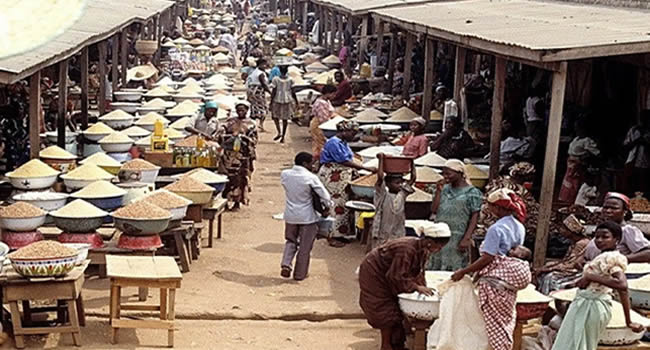Business
Rising prices of food items highlight struggle of Nigerian households —NBS

Nigerians have had to budget more to purchase food items against the backdrop of dwindling income, highlighting the pressure facing households, the National Bureau of Statistics (NBS) has revealed.
In its latest report on selected food price watch, there were increases in prices of bread, rice, cereals, potatoes, eggs, yam, meat, fruits, oil, fish among others
According to the report, in February 2021, 1 dozen of Agric eggs medium size increased year-on-year by 15.62 percent and month-on month by 1.46 percent to N518.30 in February 2021 from N510. 84 in January 2021.
The Bureau also said the average price of a piece of Agric eggs medium size (price of one) increased year-on-year by 20.50 percent and month-on-month by 2.47 percent to N47.35 in February 2021 from N46.21 in January 2021.
The average price of 1kg of tomato also increased year-on-year by 11.33 percent and decreased month-on-month by -7.07% to N269.18 in February 2021 from N289.66 in January 2021.
READ ALSO: JUST IN: Traders agree to resume north to south movement of food items in Nigeria
The average price of 1kg of rice (imported high quality sold loose) increased year-on-year by 21.02 percent and decreased month-on-month by -2.57 percent to N537.37 in February 2021 from N551.57 in January 2021.
Similarly, the average price of 1kg of yam tuber increased year-on-year by 28.11 percent and month on month by 3.47 percent to N242.82 in February 2021 from N234.67 in January 2021.
The bureau also revealed that price of ripe 1kg plantain increased by 2.92 percent to N237.04. Year on year it increased by 14.06 percent.
One litre of oil also increased by 1.93 percent to N667.43. Abia state residents paid N894.12 the highest among the 36 states.
2kg of wheat flour also increased by 13.55 percent to N758.55 from the price it sold in February 2020. Abia residents paid the highest amount N933.33 while Kwara paid N660.74 the lowest.
Other prices can be found in the report.
Defending the numbers, the NBS explained that a field work was carried out by more than 700 of its staff in all states of the federation supported by supervisors who were monitored by internal and external observers.
It said the NBS audit team subsequently conducted randomly selected verification of the prices recorded.
Join the conversation
Support Ripples Nigeria, hold up solutions journalism
Balanced, fearless journalism driven by data comes at huge financial costs.
As a media platform, we hold leadership accountable and will not trade the right to press freedom and free speech for a piece of cake.
If you like what we do, and are ready to uphold solutions journalism, kindly donate to the Ripples Nigeria cause.
Your support would help to ensure that citizens and institutions continue to have free access to credible and reliable information for societal development.
























